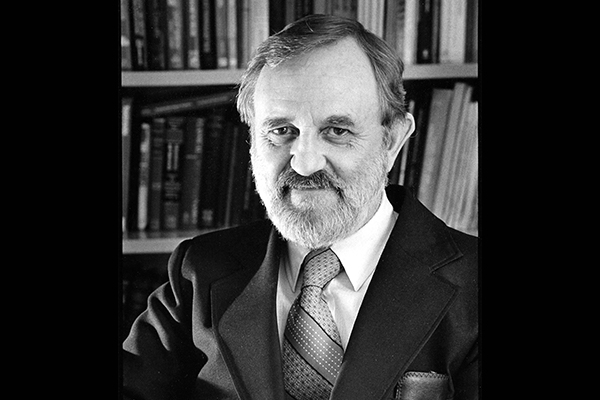by Clive A. Randall and Susan Trolier-McKinstry

ACerS Fellow and Distinguished Life Member Leslie Eric Cross (1923–2016) passed away peacefully on December 29, 2016. He was an Evan Pugh Professor Emeritus of Electrical Engineering, Pennsylvania State University, a member of the U.S. National Academy of Engineering, and a founding member of the Penn State Materials Research Laboratory.
Cross was a world leader in the field of ferroelectrics from a fundamental perspective, as an inventor of new characterization techniques, and in materials applications. He was beloved for his intelligence, vision, wit and humanity, as well as the charm with which he shared his fascination with ferroelectrics and his newest ideas. He was also an excellent mentor, and many of his students and postdoctoral researchers went on to scientific leadership positions themselves.
Cross came to the field of ferroelectricity in its infancy and to the objection of his advisor, E.C. Stoner, “Who referred to it as a trivial lattice phenomenon!” Stoner was famed for his contributions to magnetism.
World War II interrupted Cross’s undergraduate education at Leeds University (U.K.). During the war, he worked for the British Admiralty on a program using high frequency direction finding to track German U-boats, which ultimately allowed convoys to cross the Atlantic unharmed. Just two weeks after his transfer to that assignment, the boat that Cross previously served on was sunk in the Atlantic, with no survivors. Ever after, Cross thought of himself as a lucky man.
He was very proud of his long association with the Department of Defense and particularly the U.S. Navy, which supported much of his work in the field of sonar undersea transducers. He and his colleagues made many other societal contributions, such as the piezoelectric transducer used in almost all modern medical ultrasound machines.
During his career, Professor Cross was honored by many professional organizations. He was a Fellow of The American Ceramic Society, Materials Research Society, American Physical Society, Optical Society of America, and IEEE. In 1983, he was elected to the National Academy of Engineering for his contributions to the development of electroceramic, dielectric, and piezoelectric materials. ACerS honored him in 2001 with the Society’s highest honor, Distinguished Life Member. He also received the Von Hippel award of the Materials Research Society in 2010, its highest honor.
Cross joined Penn State as a senior research associate in 1961, rose through the ranks, and, in 1985, was named Evan Pugh Professor of Electrical Engineering—the highest distinction the university can bestow on a faculty member. He was the author or coauthor of more than 850 refereed papers, held 20 patents, and published a comprehensive textbook, “Domains in Ferroic Crystals and Thin Films.”
At Penn State, he mentored more than 50 graduate students from across the world, including Professor Yao Xi, the first Chinese Ph.D. (1982) educated in the U.S. following the Cultural Revolution.
Cross will be sadly missed by all that knew him and worked with him. He shared his ideas freely with everyone that he met at scientific conferences, from graduate students to senior leaders in the field. He and his family—wife Lucilla (Cilla), a reluctant but gracious member of the ferroelectrics community by osmosis, and children Peter, Matthew, Daniel, Rachel, Elizabeth, and Rebecca—opened their home to generations of students and colleagues.
Very nice memories of the scholar, passion, and personality of Professor Cross can be appreciated on IEEE’s Engineering and Technology History Wiki, which published an interview with Cross in 2011.
